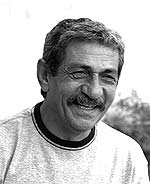This text is the postscript of Nasrolah Kasraian in his book called "Desert". It includes also a number of his photos.

|
|
I think the word “desert” suggested a romantic conception and as a result, to some degree, is nostalgic. If not from my young hood, since my youth, at least I always have the same notion of the word “desert”. The desert seem to be a place far from us, a very remote place, a wonderful place, unusual yet very inviting that, although with the notion we have of, it seems not very suitable place for living, still one can take refuge in it, escape into it. I suppose, for those, who live in the northern hemisphere, where there is more rain and abundance of tree and green, the romantic overtones of the word should grow even more. But why for me, for who live in a land that nearly one third of it are desert, for someone like me that desert starts right behind the gates of the city of his residence.
Perhaps the desert attract me for its privacy, its silence, a silence that sometimes I need it very badly; maybe it is because of its openness, its conveying a sense of infinity; its bright and burning sun during the day and its starry skies at night; may be it is for its plays with light, its mirages that in their realness are all pure illusion; may be it is for being devoid of any kind of pollution, its briefness, simplicity, and its unmatched frankness in defining the minimums. May be it is for the warm color of its sands at the evening, or the possibility to roll in its soft and slippery sand-dunes and maybe because in some parts of it, one can drive with a speed more than 100 km., eyes shut and without worriment about an eventual car crash.
I don’t know, but somehow desert always makes me feel a kind of freedom and liberty. The attraction of desert, whatever they are or they are not, there is any doubt that the desert means absence of government, or where only the natural compulsions govern. It seems that there s a nexus between desert and anarchy; it seems that there is a nexus between desert and liberty.
In city, authorized agents as the guardians of political sovereignty and dominant culture, in every step and in every second by way of reminding tell you what to do and what not to do, but in desert, infinitely vast open spaces invite you to do whatever you wish. In desert sometimes you can drive for hundred of kilometers, without being disturbed by anybody; in desert you can simply be dressed or even undressed as you like, you can eat and drink whatever you like and, finally, you can always make without damaging anybody’s health, except your own. In desert, it seems that the right of choose is much more respected than in the most places, where human beings have built or established something. And of course it is very interesting to note how human being could have restricted their liberty by the very fruit of their workmanship.
So, perhaps, from a politico- philosophical viewpoint, desert means the absolute freedom, and if we consider “man” as a political being, which in fact is, then we can say that the desert is the place, where the ideal government exists, as anarchists intend the term. And for me, as an intellectual, who lives under the load of all kinds of political and social pressures this means “liberty”.
But this does not mean the absence of other kind, or kinds, of constraints in the desert. In desert the “human life is complicated by natural determinism”. Who is entangled with this natural determinism does not have bottles of soft drink in ice-box ready in his/her car and, also, is deprived from the pleasure of eating a cold compote of pear under the burning sun of the desert. To quench his/her thirst and irrigate a few trees, he/she has to dig hundred and even thousands shaft of wells, connect them all under the ground and construct a “Qanat”. With eyes continuously fixed on the sky, he/she knows well that the thin clouds in the desert’s sky are so envious one should never pin a hope on them. Man entangled with natural coercions, who can be called “homo deserted”, should have learned that in the heat of the summer and in the cold breeze of the winter, do not having a non-conductor shelter of mud and brick means death. The desert man knows that it is not possible to graze cattle on a land that hardly a plat grows in it. Vis-à-vis the urbanized man the natural determinism affects the desert man in a much more different way, and, perhaps, it is for this same reason that he/she is so hard working, contended and fatalist. If one has seen the desert, then he/she could understand why desert dwellers are what they are.
As an urbanized intellectual, not only feel great sympathy for whoever is intricate by the desert’s natural determinism and wish him/her a more comfortable life, but also I wish that nine tenth of the deserts of my homeland will be changed to agricultural and wood lads. To feel myself free and eliminate my nostalgia the remaining one tenth quite suffice.
